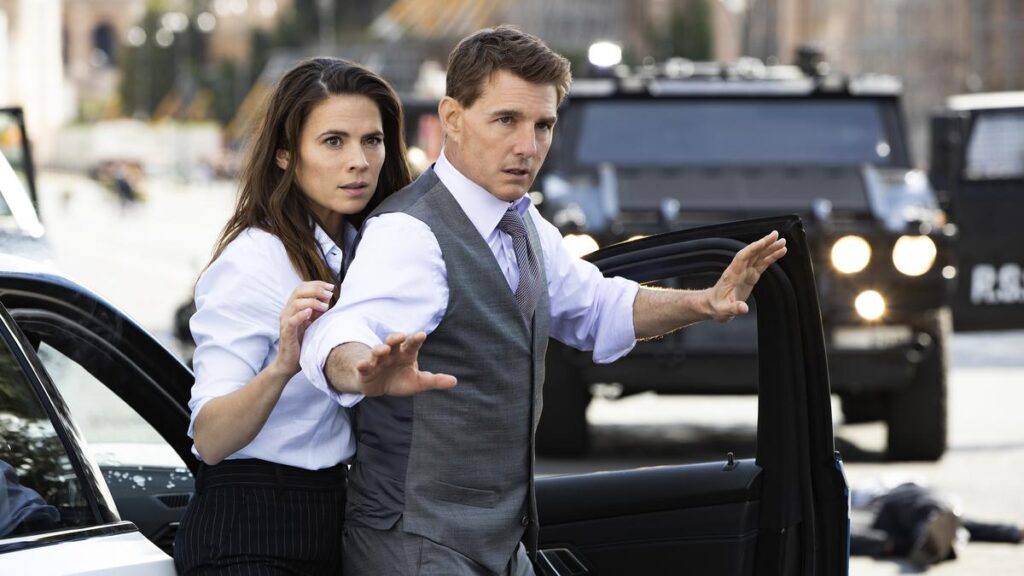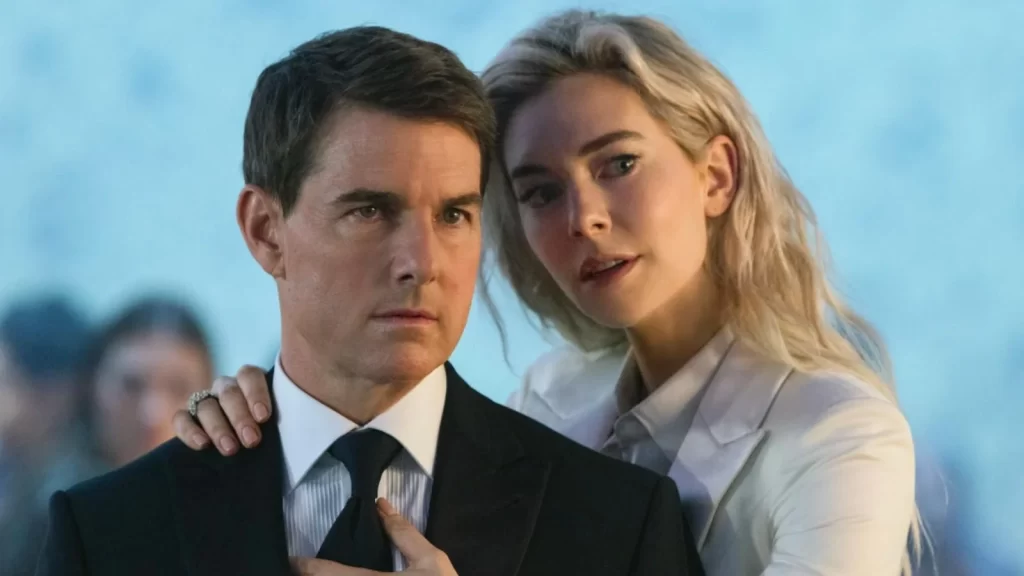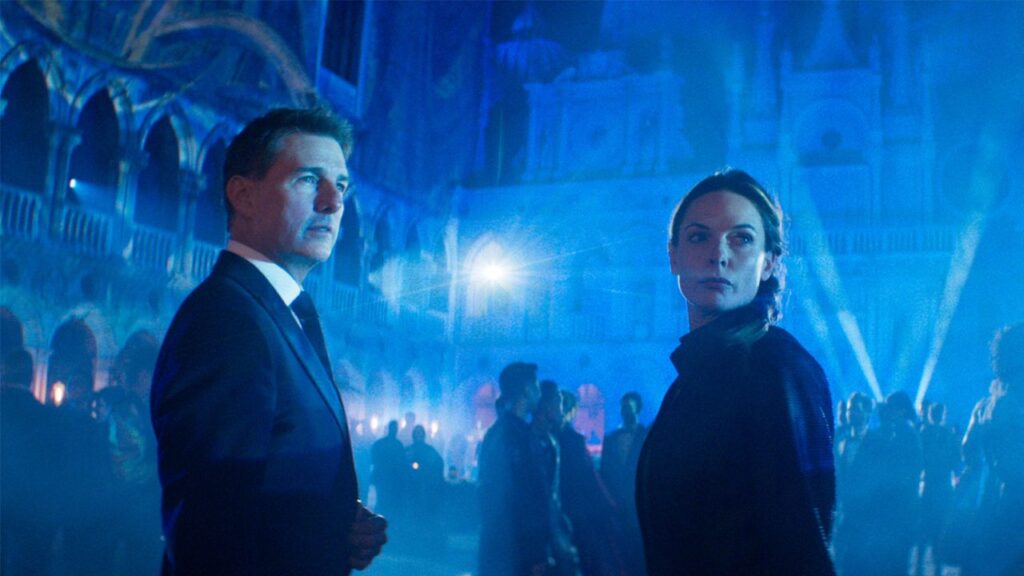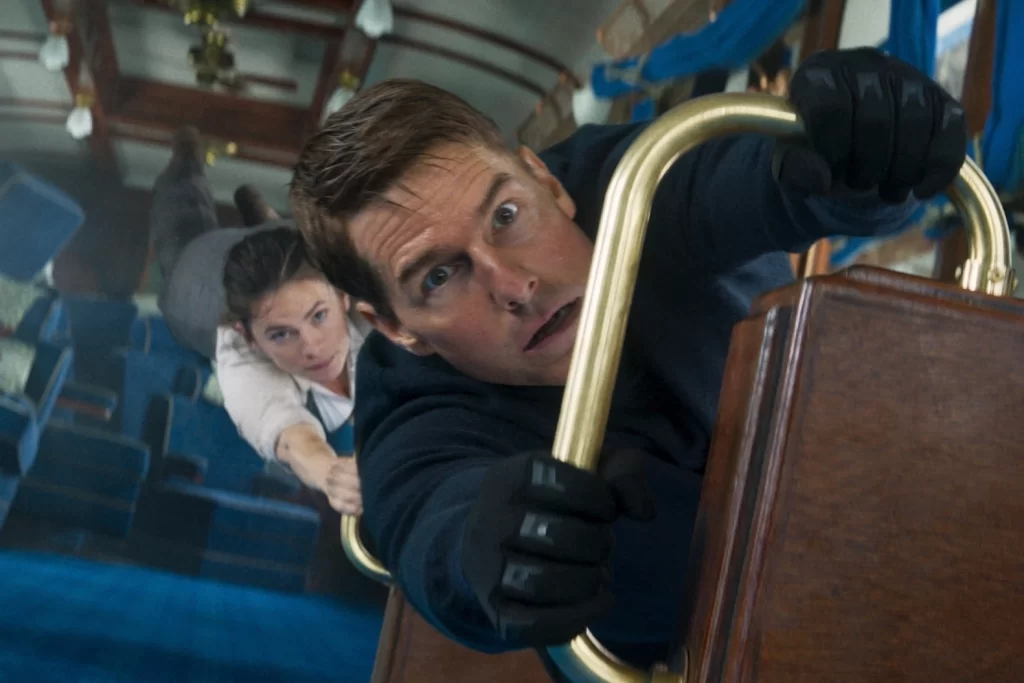
The Mission: Impossible franchise doesn’t change so much as grow. It’s a creature of controlled entropy; it keeps getting bigger—longer runtimes, more elaborate plotting, increasingly crazed stunts—but it always subjects its maniacal absurdity to meticulous quality control. Two movies ago, in the spectacular Rogue Nation, a bureaucrat memorably described Ethan Hunt—the indefatigable superspy played by Tom Cruise as a cross between James Bond and the Road Runner—as “the living manifestation of destiny.” This time around, in Dead Reckoning, Part One, a beleaguered company man (Shea Whigham) calls him “a mind-reading, shape-shifting incarnation of chaos.” You get the idea: This dude is committed, and he ain’t slowing down.
You might say the same thing about Cruise, though the one enemy that Hollywood’s most fanatical star seems unlikely to vanquish is Father Time. Yet one of the pleasures of Dead Reckoning is how it probes the tension between its 61-year-old lead’s eternal charm and the inexorable fact of his own mortality. I’m not suggesting that Cruise shows his age here; he remains extraordinarily fit and good-looking, and he performs feats of derring-do that would make actors of any generation blanch. But the man who leapt into multiplexes for Brian De Palma in the summer of 1996, hovering inches above the floor as a bead of sweat slid perilously across his brow, has gradually lost some of his invincibility. When this Ethan runs, you feel his muscles ache.
His heart aches too, though it takes some time for that pain to register. For its first hour or so, Dead Reckoning breezes along as a superior example of live-wire choreography, engaging espionage, and blockbuster craftsmanship—you know, a Mission: Impossible movie. Our director here is Christopher McQuarrie, the Cruise whisperer who took over from a rotating crew of auteurs in Rogue Nation and has since gently nudged the series away from standalone sublimity and toward amiable continuity. In fact, the greatest misstep of the screenplay, which McQuarrie wrote with Erik Jendresen, is its suggestion that Ethan is the victim of a tragic backstory, a thinly sketched notion that will presumably be fleshed out when this two-part thriller delivers its conclusion next year. The character is hardly a robot—indeed, one of the benefits of McQuarrie’s ongoing stewardship is that it’s allowed Cruise to hone a warm and winning rapport with his regular supporting cast—but saddling him with a heretofore unknown motivation for his demented zeal is a misguided retcon. These movies are too present to get stuck in the past.

But it’s silly to complain about a fleeting flashback when Dead Reckoning otherwise moves with such lively and decisive force. Its plot isn’t exactly trivial (more on that in a bit), but it’s less convoluted than the labyrinthine machinations of the prior installment (the stupendous Fallout), and it remains properly subservient to the silky spycraft and the extravagant set pieces. In simple terms (because why complicate things?), Ethan and his team need to procure a key, which neatly splits into two interlocking pieces. They must locate this metal MacGuffin before it falls into the hands of other interested parties—amoral terrorists, foreign governments, even their own bosses at the IMF (“The world bank?” “No, sir, the Impossible Mission Force”)—who will surely wield it for devious ends. This simple assignment will require Ethan to complete a broad array of outrageous tasks: charging through the dusty desert in Arabia (one of several sequences that recalls John Wick: Chapter 4), invading his own intelligence headquarters in America, stalking through the heavily secured airport corridors of Abu Dhabi, careening amid the crowded streets and tunnels (not to mention stairways) of Rome, crashing an upscale party in Venice, and finally battling aboard and above the freaking Orient Express as it snakes its way through the Austrian Alps.
It’s a lot, but it never feels overwhelming, thanks to the robust grace of McQuarrie’s filmmaking. Conceptually speaking, he hasn’t concocted anything as bravura as the franchise’s most seminal sequences: Cruise sprinting down the façade of the Burj Khalifa in Ghost Protocol, that aforementioned suspension scene from the original, even the helicopter fight from Fallout. But he has orchestrated all of the delirious mayhem with an exhilarating mixture of pandemonium and precision. Dead Reckoning is a work of barreling speed, yet it also prizes weight, coherence, and visibility. The Rome car chase—in which Ethan finds himself handcuffed to a woman in a tiny yellow Fiat as they flee a merciless assassin (Pom Klementieff, of the Guardians of the Galaxy films) and her destructive black Humvee—unfolds at breakneck velocity but also with marvelous clarity and wit, mingling technological might with Looney Tunes-inspired comedy. (Speaking of comedy, the latex masks that were once vehicles for shock have now morphed into instruments of humor, whether it’s the Hitchcock-style scene of a background player quietly plotting an attack, or the sight of Whigham’s grunt constantly pawing at people’s faces, or a duped official recognizing the gambit and groaning, “Of course.”) That frantic pursuit is veritable window dressing compared to the train climax, a balletic whirlwind of guile and chaos which, in its final white-knuckle moments, slams on the brakes and lends new meaning to the term vertical integration.

Ethan’s central companion in those two scenes—the woman who variously serves as his quarry, his adversary, or his partner—is Grace (Hayley Atwell), an expert thief whose light-fingered touch quickly sends her over her head. She’s the most significant new character in Dead Reckoning, which otherwise makes adroit use of returning faces; Ving Rhames and Simon Pegg remain sturdy suppliers of surveillance tips and comic relief, Vanessa Kirby reprises her role as the unscrupulous White Widow, and Henry Czerny—Ethan’s very first disapproving and suspicious superior—reemerges as the officious Kittridge. This retinue of old friends imposes a particular challenge on Atwell, who must strike immediate sparks with her castmates without relying on the crutch of our familiarity and goodwill. She’s largely up to it; from the instant Ethan and Grace pick each other’s pockets during an encounter that’s part standoff, part seduction, Cruise and Atwell evince a strong chemistry that brings credibility to Grace’s subsequent recruitment.
Still, despite Atwell’s swift acclimation, Grace isn’t the movie’s most important secondary figure. That would instead be Ilsa Faust, the MI6 operative again played with deadly flair by Rebecca Ferguson. To the extent the Mission: Impossible series has an emotional throughline, it is Ethan’s abiding loyalty to his team; his strength as a hero derives not just from his physical aptitude or his extreme dedication, but his inner decency. Nowhere is this more evident than in his relationship with Ilsa, who is his arguable equal in terms of skill and cunning, and who triggers in him a mutual admiration that no standard love interest ever could. Three pictures into their collaboration, Cruise and Ferguson have never so much as kissed, but the affection between their characters is palpable, and in a handful of silent gestures—a shared glance in a car, a warm touch on a balcony, a clasped hand in a boat—they articulate the film’s personal stakes.

And those are more interesting than you might expect. It’s silly to suggest that Dead Reckoning’s primary goal is anything other than excitement—not when it features Ilsa carrying a fucking sword, or Ethan vaulting from a cliffside on his trusty motorcycle, or everything that happens on the roof of that bullet train. But underlying all of this eye-popping action is a curious truth: This is the first Mission: Impossible movie that might actually be about something.
The main villain in Dead Reckoning isn’t a traitor, an arms dealer, or a separatist. In fact, it isn’t a person at all. It is instead “the Entity,” a sentient artificial intelligence bent on commandeering the globe’s military defense systems. As the world’s regimes scramble for exclusive control of its power, Ethan resolves to destroy the Entity, perceiving it as an existential threat not just to his country, but to all of humankind.
The trope of machines conquering men is as old as science-fiction itself, but there is another thematic layer at work here. It is (forgive me) impossible to watch Dead Reckoning in July 2023 and not be reminded of the recently enacted strike by the nation’s writers and actors, a sticking point of which is the studios’ exponentially increasing use of A.I. Cruise, in his later years, has anointed himself the patron saint of flesh-and-blood cinema—of the holy values of practical stunt work and spit-and-glue filmmaking. The apocalypse he fears is not one of burning cities and deadly radiation, but of a Hollywood clearinghouse that makes movies exclusively through computers, and that recycles actors’ faces and movements with the casual push of a button. Dead Reckoning, in its own feverish way, is an urgent and impassioned argument against such a mechanized future, and a tribute to the artisans and laborers responsible for the industry’s existence.

The richness of this metaphor isn’t without some tangible drawbacks; although McQuarrie delivers some eye-catching blue lighting during a party, an invisible algorithm is hardly the most potent on-screen antagonist. For this reason, the Entity is represented—not exactly personified, but in the more literal sense of being served via an ambassador—by Gabriel (Esai Morales), an omniscient heavy who straddles the line between human and cyborg. Yet despite Morales’ serpentine charisma, Gabriel lacks the imposing authority of the genre’s most daunting villains.
All the same, there is something oddly moving about Cruise and McQuarrie’s devotion to their art form, and how they express that devotion with such energy and rigor. During a delightful early code-breaking sequence in Dead Reckoning, the characters must solve the riddle, “What is always approaching but never arrives?” The answer—apologies for the spoiler—is “tomorrow.” But while the movie views the encroaching prospect of that tomorrow through ominous eyes, it also provides a vibrant defense of the action cinema of today. A.I. hasn’t beaten us yet. Come to think of it, you can take comfort in the knowledge that this review was written by an actual human, not the Entity.
Then again, that sounds like something the Entity would say.
Grade: A-
Jeremy Beck is the editor-in-chief of MovieManifesto. He watches more movies and television than he probably should.

This is all well and good but can we expect a full-on Barbenheimer review next week?!
So the current tentative plan is to review each separately, with the pieces arriving on Wednesday and Friday, respectively. I might try to combine them, but I’m skeptical they’re amenable to joint analysis, and the internet seems to have already exhausted all potential avenues of #Barbenheimer discourse. Stay tuned!